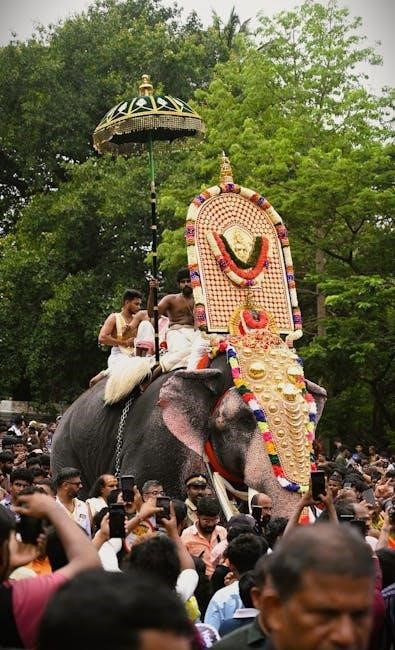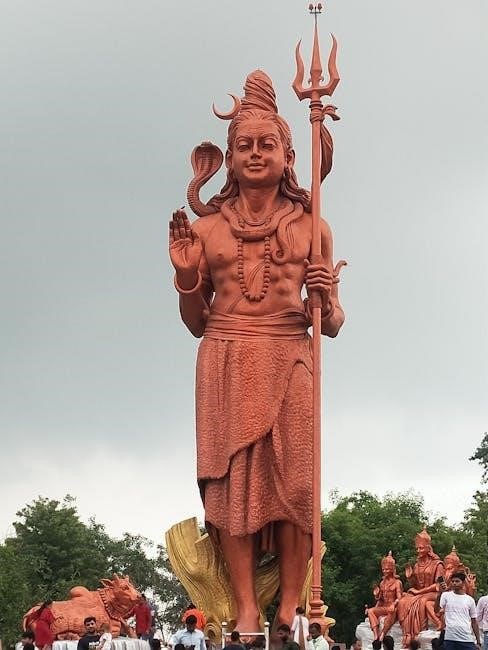lord shiva ashtothram in telugu pdf
Lord Shiva Ashtothram is a sacred devotional prayer consisting of 108 names of Lord Shiva‚ revered in Hinduism for its spiritual significance and divine connection.
What is Lord Shiva Ashtothram?
Lord Shiva Ashtothram is a sacred Hindu devotional hymn dedicated to Lord Shiva‚ comprising 108 divine names that extol his virtues‚ attributes‚ and divine forms. These names‚ deeply rooted in Hindu scriptures‚ reflect Shiva’s cosmic role as the destroyer‚ preserver‚ and creator; The Ashtothram is a poetic expression of devotion‚ often recited in praise of Shiva to seek his blessings‚ peace‚ and spiritual enlightenment. It is a powerful tool for connecting with the divine‚ fostering inner peace‚ and understanding the multifaceted nature of Lord Shiva. The recitation of these 108 names is considered a complete worship‚ symbolizing the universe’s infinite aspects and Shiva’s omnipresence.
Significance of Ashtothram in Hindu Devotion
Ashtothram holds profound significance in Hindu devotion as a powerful tool for spiritual growth and divine connection. It embodies the essence of worship‚ offering a structured way to express devotion and seek blessings. The recitation of these 108 names fosters a deep emotional and spiritual bond with Lord Shiva‚ symbolizing surrender and reverence. Ashtothram is believed to purify the mind‚ bring inner peace‚ and grant spiritual enlightenment. It is often recited during rituals‚ festivals‚ and personal worship to invoke Shiva’s grace and protection. The practice is deeply rooted in Hindu tradition‚ emphasizing the importance of devotion‚ mindfulness‚ and the pursuit of divine harmony. By chanting Ashtothram‚ devotees transcend worldly concerns‚ connecting with the eternal and universal consciousness of Lord Shiva.

Lord Shiva Ashtothram in Telugu
Lord Shiva Ashtothram in Telugu is a revered prayer featuring 108 sacred names of Shiva‚ cherished for its lyrical beauty and deep devotional significance in Telugu culture.
Importance of Reciting Ashtothram in Telugu

Reciting Lord Shiva Ashtothram in Telugu holds profound cultural and spiritual significance‚ especially in Telugu-speaking communities. It fosters a deep emotional connection and devotion to Lord Shiva‚ allowing devotees to express their reverence in their mother tongue. The lyrical quality of Telugu enhances the recitation‚ making it melodious and heartfelt. Additionally‚ reciting in Telugu ensures the preservation of ancient traditions and linguistic heritage. It also facilitates easier understanding and pronunciation for Telugu-speaking devotees‚ enabling them to focus on the spiritual essence of the prayer. This practice strengthens faith‚ promotes mental clarity‚ and fosters a sense of unity among worshippers. Ultimately‚ it serves as a powerful medium for seeking blessings‚ peace‚ and spiritual growth.
Cultural Relevance of Telugu in Devotional Practices
Telugu‚ one of the oldest Dravidian languages‚ holds a revered place in Hindu devotion‚ particularly in South India. Its melodious nature‚ often termed the “Italian of the East‚” makes it ideal for hymns and prayers. Telugu has been a medium for numerous Vedic and Puranic texts‚ enriching spiritual practices. In Telugu-speaking regions‚ devotional songs and chants in the language are integral to rituals and daily worship‚ fostering a deep cultural identity. Reciting Lord Shiva Ashtothram in Telugu connects devotees to their heritage‚ ensuring traditions are preserved. This linguistic-cultural harmony strengthens communal bonds‚ making devotion accessible and meaningful. Thus‚ Telugu’s role in spirituality is not just linguistic but a vital part of cultural continuity and faith expression.
Benefits of Reciting Lord Shiva Ashtothram

Reciting Lord Shiva Ashtothram brings spiritual growth‚ cleanses past sins‚ and attracts divine blessings‚ fostering inner peace‚ mental clarity‚ and a deeper connection to the Almighty.
Spiritual Benefits of Chanting Ashtothram
Chanting Lord Shiva Ashtothram offers profound spiritual benefits‚ including a deeper connection to the divine‚ purification of the soul‚ and alignment with cosmic energy. It is believed to ward off negativity‚ enhance mental clarity‚ and foster emotional balance. Devotees experience inner peace and spiritual growth‚ as the sacred names of Lord Shiva resonate within‚ elevating consciousness. Regular recitation strengthens faith‚ cultivates humility‚ and helps seekers attain a higher state of awareness. The practice is also considered a powerful tool for seeking divine grace and blessings‚ making it a cornerstone of Hindu devotional practices. By chanting Ashtothram‚ one not only honors Lord Shiva but also embarks on a journey of self-realization and spiritual enlightenment.
Emotional and Mental Well-being Through Recitation
Reciting Lord Shiva Ashtothram fosters emotional and mental well-being by calming the mind and soothing the soul. The rhythmic chanting of sacred names helps reduce stress and anxiety‚ promoting relaxation and inner harmony. It cultivates a positive mindset‚ dispelling negativity and fostering emotional balance. The practice also enhances focus and concentration‚ leading to mental clarity and stability. By connecting with the divine energy of Lord Shiva‚ devotees experience solace and strength‚ which aids in overcoming emotional challenges. Regular recitation instills resilience and peace‚ making it a powerful tool for maintaining mental health and emotional equilibrium in daily life.

How to Recite Lord Shiva Ashtothram

Begin with a calm mind‚ light a lamp‚ and sit comfortably. Recite each name slowly‚ focusing on pronunciation and meaning. Use the Telugu PDF for guidance and clarity.
Step-by-Step Guide to Reciting Ashtothram
Prepare by cleansing your space and sitting in a serene posture. Open the Telugu PDF and begin with a prayer to Lord Shiva. Recite each of the 108 names slowly‚ focusing on proper pronunciation and meaning. Pause briefly after each name to reflect on its significance. Offer flowers or water as an act of devotion. Maintain concentration throughout the recitation to enhance its spiritual impact. Conclude by seeking Lord Shiva’s blessings for peace and prosperity. Finally‚ share the blessings with others to amplify the positive energy. This structured approach ensures a meaningful and effective recitation experience.

Best Times and Practices for Recitation
The ideal time to recite Lord Shiva Ashtothram is during the early morning or evening‚ considered auspicious for spiritual practices. Begin by cleansing your hands and space. Sit comfortably with a calm mind and focus on the Telugu PDF. Recite each name clearly‚ maintaining proper pronunciation. Use a Rudraksha mala to keep track of the 108 names. Avoid distractions and maintain concentration to deepen the spiritual experience. Chanting during festivals like Maha Shivaratri amplifies its significance. Regular recitation fosters discipline and enhances devotion. Offer prayers with sincerity to seek Lord Shiva’s blessings for peace and prosperity.
Lord Shiva Ashtothram PDF in Telugu
A convenient resource for devotees‚ the Telugu PDF version of Lord Shiva Ashtothram is easily accessible and formatted for seamless recitation‚ enhancing your spiritual practice.
Availability of Telugu PDF Versions
Telugu versions of Lord Shiva Ashtothram PDF are widely available online‚ accessible through official temple websites‚ religious platforms‚ and eBook repositories. These PDFs are often free to download‚ ensuring easy access for devotees worldwide. Many websites offer high-quality versions with clear fonts and proper formatting‚ making them suitable for both digital and printed use. Additionally‚ some platforms provide downloadable links directly‚ allowing users to save and recite the Ashtothram effortlessly. The availability of these PDFs has made it convenient for Telugu-speaking devotees to incorporate this sacred prayer into their daily spiritual routines‚ fostering a deeper connection with Lord Shiva. The widespread distribution ensures that devotees can access this sacred text without hassle‚ regardless of their location or device.
How to Download and Use the PDF Effectively
To download the Lord Shiva Ashtothram PDF in Telugu‚ visit reputable temple websites or religious platforms offering free downloads. Ensure the source is trustworthy for authenticity. Once downloaded‚ save it in an easily accessible folder on your device. For effective use‚ create a peaceful environment‚ sit comfortably‚ and recite the Ashtothram with concentration. Use headphones for an immersive experience or print the PDF for traditional recitation. Utilize features like zoom for better readability or bookmark important sections. Regular recitation fosters spiritual growth and mental calmness. Offline access ensures uninterrupted use during travels or meditation sessions. Consider sharing the PDF with fellow devotees to spread its blessings and significance.

Cultural and Spiritual Impact
Lord Shiva Ashtothram in Telugu embodies cultural heritage and spiritual devotion‚ connecting devotees to divine energy and fostering peace‚ unity‚ and reverence for Lord Shiva across generations.
Role of Ashtothram in Telugu-Speaking Communities
Lord Shiva Ashtothram holds immense significance in Telugu-speaking communities‚ serving as a bridge to spiritual connection and cultural identity. It is often recited during festivals‚ pujas‚ and daily worship‚ fostering unity and devotion. The Telugu version of Ashtothram is deeply cherished for its rhythmic and lyrical appeal‚ making it accessible and heartfelt for devotees. It reinforces the teachings of Lord Shiva‚ emphasizing values like humility‚ forgiveness‚ and self-realization. In community gatherings‚ its recitation strengthens bonds and collective spiritual growth. The availability of the Telugu PDF further enhances its reach‚ allowing devotees to carry and recite the prayer with ease‚ ensuring its timeless relevance in preserving cultural and spiritual heritage.

Ashtothram as a Tool for Spiritual Growth
Lord Shiva Ashtothram serves as a powerful tool for spiritual growth‚ guiding devotees toward self-realization and inner peace. Reciting the 108 names of Lord Shiva fosters mindfulness‚ self-reflection‚ and emotional balance. Each name carries profound meaning‚ connecting the reciter to Shiva’s divine attributes‚ such as compassion‚ wisdom‚ and liberation. The rhythmic chanting helps quiet the mind‚ allowing for deeper meditation and a stronger bond with the divine. Regular recitation strengthens faith‚ cultivates humility‚ and nurtures a sense of detachment from worldly desires. The Telugu PDF version makes this sacred prayer accessible‚ enabling devotees to practice it anywhere‚ thereby facilitating continuous spiritual evolution and a closer connection to Lord Shiva’s eternal essence.
